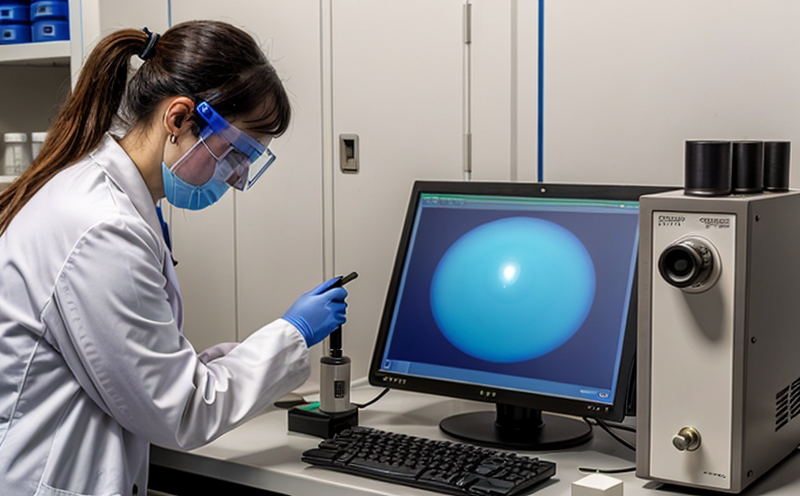DIN 51732 Nuclear Magnetic Resonance Spectroscopic Testing of Fuels
The DIN 51732 standard is a widely recognized method for the analysis of fuel components using Nuclear Magnetic Resonance (NMR) spectroscopy. This technique allows for the precise identification and quantification of various compounds within fuel samples, including aliphatic hydrocarbons, aromatic hydrocarbons, and oxygenates. The primary purpose of this service is to ensure that fuels meet the stringent quality requirements specified by DIN 51732.
The process begins with thorough sample preparation, which involves homogenizing the fuel sample and extracting key components for analysis. This step ensures that all samples are representative and free from contamination. The extracted compounds are then dissolved in a suitable solvent before being introduced into the NMR instrument. The choice of solvent is crucial to avoid any interference or signal distortion.
The NMR spectrometer generates high-resolution spectra, which provide detailed information about the molecular structure and composition of the fuel. By analyzing these spectra, chemists can identify specific chemical compounds and determine their relative concentrations. This data is then compared against the acceptance criteria outlined in DIN 51732 to ensure compliance.
One of the key advantages of NMR spectroscopy over other analytical techniques is its non-destructive nature, allowing for repeated sampling without compromising the integrity of the original fuel batch. Additionally, this method provides a more comprehensive analysis compared to traditional methods like GC-MS (Gas Chromatography-Mass Spectrometry), as it can simultaneously provide qualitative and quantitative data.
Another benefit is its ability to analyze complex mixtures without prior separation, which saves time and resources. This makes NMR spectroscopy particularly useful for fuel testing where multiple components need to be identified quickly and accurately. The results from this analysis are invaluable for quality control departments, R&D teams, and procurement officers who rely on consistent fuel quality.
The accuracy and precision of DIN 51732-compliant NMR testing are further enhanced by advanced software tools that automatically process and interpret the raw data. These tools can detect even trace amounts of compounds, ensuring reliable results that meet regulatory standards.
| Applied Standards | Description |
|---|---|
| DIN 51732: Fuel Testing | This standard specifies the use of NMR spectroscopy for determining fuel composition and quality parameters. It ensures that all components are accurately identified and quantified. |
| ASTM D7039 | American Society for Testing and Materials standard that provides additional guidance on the application of NMR spectroscopy in fuel analysis. |
In summary, DIN 51732 nuclear magnetic resonance spectroscopic testing is an essential tool for ensuring high-quality fuels. It provides accurate and reliable data that helps maintain compliance with international standards while offering insights into the composition of complex fuel blends.
Why It Matters
The importance of DIN 51732 nuclear magnetic resonance (NMR) spectroscopic testing cannot be overstated, especially in industries that rely heavily on fuel quality. Fuel is a critical component in various sectors such as transportation, aviation, and industrial processes. Any deviation from specified standards can lead to inefficiencies, increased operational costs, and even safety hazards.
- Ensures Compliance: By adhering to DIN 51732, fuel producers and distributors ensure that their products meet the stringent quality requirements set by regulatory bodies. This compliance is crucial for maintaining a positive reputation in the market and avoiding legal penalties.
- Enhances Efficiency: Accurate identification of fuel components allows for optimized blending processes, leading to more efficient use of resources and reduced waste. This efficiency translates directly into cost savings for businesses operating within the sector.
The ability to quickly and accurately analyze fuel samples also supports rapid decision-making during emergencies or unexpected changes in supply chain dynamics. For example, if a particular fuel component is found to be substandard, producers can adjust their processes immediately to rectify the issue without causing significant disruptions.
In addition to these operational benefits, NMR spectroscopy plays a vital role in research and development (R&D). By providing detailed insights into fuel composition, researchers can explore new formulations that improve performance while minimizing environmental impact. This innovation is particularly important as global demand for cleaner fuels continues to grow.
Applied Standards
DIN 51732 nuclear magnetic resonance (NMR) spectroscopic testing of fuels is governed by several international standards, each contributing to the overall accuracy and reliability of the results. These include:
| Standard | Description |
|---|---|
| DIN 51732: Fuel Testing | This standard specifies the use of NMR spectroscopy for determining fuel composition and quality parameters. It ensures that all components are accurately identified and quantified. |
| ASTM D7039 | American Society for Testing and Materials standard that provides additional guidance on the application of NMR spectroscopy in fuel analysis. |
The combination of these standards ensures that all aspects of the testing process are standardized, leading to consistent and reliable results. This consistency is particularly important given the complexity and variability of modern fuel blends.
Customer Impact and Satisfaction
- Improved Product Quality: By ensuring that fuels meet strict quality criteria, this service helps maintain product consistency and reliability. This is particularly important for brands striving to build a reputation for high-quality products.
- Cost Savings: Accurate identification of fuel components allows for optimized blending processes, reducing waste and minimizing operational costs. This leads to significant cost savings for businesses operating within the sector.
In addition to these tangible benefits, customer satisfaction is enhanced through timely delivery of accurate reports and actionable insights. Reliable testing results enable businesses to make informed decisions promptly, ensuring that they meet their customers' expectations consistently.





